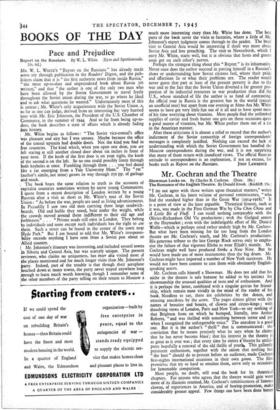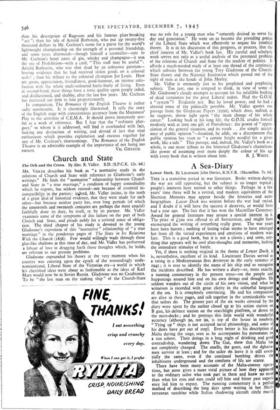Mr. Cochran and the Theatre
Showman Looks on. By Charles B. Cochran. (Dent. I85.) The Romance of the English Theatre. By Donald Brook. (Rockliff. I 5s.;
"I DO not agree with those writers upon theatrical matters," writes Mr. Cochran, in his latest volume of personal reminiscence, "who find the standard higher than in the Great War (1914-1918)." It is a point of view at the least arguable. Theatrical history, such as it was, was made in the First German War by Chu Chin Chow and A Little Bit of Fluff. I can recall nothing comparable with the Olivier-Richardson Old Vic productions ; with the Gielgud season at the Haymarket ; even with the indefatigable effort of Mr. Donald Wolfit—which is perhaps rated rather unduly high by Mr. Cochran. But what have been missing for far too long from the London theatre are Mr. Cochran's touch, and Mr. Cochran's productions. His generous tribute to the late George Black serves only to empha- sise the failure of that vigorous Elisha to wear Elijah's mantle. Mr. Cochran might well have produced Strike a New Note. But he would have made use of more instruments than the big drum. Mr. Cochran might have imported a number of New York successes. He would not have been content to cast them with obstinately English- speaking actors.
Mr. Cochran calls himself a Showman. He does not add that his niche in the theatre is safe because he added to his instinct for showmanship the unusual qualities of taste and of enthusiasm. And it is perhaps the latter, combined with a singular genius for friend- ship, which remain most vividly in the mind of the reader of his book. Needless to say, there are celebrities by the dozen, and amusing anecdotes by the score. The pages almost glitter with the names of beauties and boxers, of clowns and circus-kings • with dissolving views of London, Paris and New York—to say noting of that Brighton front on which he bumped, literally, into Arthur Roberts, "and was thrilled with something between terror and joy when I recognised the unforgettable voice." The anecdote is a good one. But it is the author's " thrill " that is communicated: the conviction that he means precisely what he says when he claims that he has never become blasé ; that his interest in the theatre is as great as it ever was ; that every time he enters tr`theatre he antici- pates hopefully a renewal of the old thrills of youth, This gallantly persistent enthusiasm, together with the axiom that nothing but "the best" should do to present before an audience, made Cochran first-nights international occasions in their own genre. The film premieres that try so hard to emulate them, serve only as occasions for lamentable comparison.
Most people, no doubt, will read the book for its theatrical chapters. For anyone who agrees that the theatre would gain were more of its illusions retained, Mr. Cochran's reminiscences of famous clowns, of experiences in America, and of boxing-promotion, make considerably greater appeal. Few things can have been done better than his description of Bagessen and his famous plate breaking "act "; than his tale of Arnold Rothstein, who put up twenty-five thousand dollars in Mr. Cochran's name for a purse for the world's lightweight championship on the strength of a personal friendship, and some years afterwards—though himself a teetotaller—sent to Mr. Cochran's hotel cases of gin, whisky and champagne—it was the era of Prohibition—with a card, "This stuff may be useful ": Arnold Rothstein, who was shot dead by an unknown gunman— leaving evidence that he had received stolen goods on a colossal scale! ; than his tribute to the coloured champion Joe Louis. Here are gusto, appreciation, friendliness, good-humour, an intense satis- faction with the whole multi-coloured hurly-burly of living. Even at second-hand, these things have a tonic quality upon people jaded, and disillusioned, and shabby, after the last five years. Mr. Cochran has increased our debt to him proportionately.
In comparison, The Romance of the English Theatre is rather sadly unromantic. It is charmingly illustrated. It tells the story of the English stage with conscientious accuracy from the Mummers' Play to the activities of C.E.M.A. It should prove immensely use- ful as a work of reference. But I fear that the "ordinary play- goer," to whom it is addressed, will find it overloaded with fact, lacking any distinction of writing, and devoid of just that vital enthusiasm which provides explanation and excuses together for any of Mr. Cochran's shortcomings. The Romance of the English Theatre is an admirable example of the importance of not being too































 Previous page
Previous page